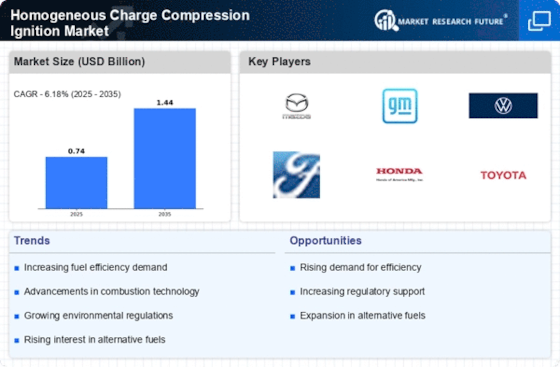Top Industry Leaders in the Homogeneous Charge Compression Ignition Market

*Disclaimer: List of key companies in no particular order
Top listed companies in the Homogeneous Charge Compression Ignition industry are:
BMW (Germany), Daimler AG (Germany), General Motors (US), Honda Motor Company, Ltd. (Japan), Hyundai Motor Company (South Korea), Mazda Motor Corporation (Japan), Volkswagen of America, Inc. (Germany), Nissan Motor Co., Ltd., (Japan), Audi AG (Germany), and Mercedes-Benz USA, LLC, (Germany)
Competitive Landscape of the Homogeneous Charge Compression Ignition (HCCI) Market: A Business Analysis
The HCCI market, still in its nascent stage, presents a fascinating battleground for established automakers and innovative startups vying for a slice of the future of internal combustion engines. Understanding the competitive landscape is crucial for navigating this burgeoning market and identifying potential winners.
Key Players and Strategies:
Traditional Automakers: Giants like Toyota, Hyundai, and Volkswagen leverage their vast R&D budgets and existing infrastructure to develop HCCI technology for integration into their mainstream vehicles. Their focus lies on overcoming technical challenges and achieving cost-effectiveness for mass production.
Startups and Technology Partners: Companies like Achates Power, Ricardo, and AVL play a critical role in pushing the technological boundaries of HCCI. They specialize in specific components or subsystems, partnering with automakers for integration and commercialization. Their strategies involve rapid prototyping, IP licensing, and collaboration with research institutions.
Government and Research Entities: Government funding agencies and academic institutions like MIT and Sandia National Laboratories play a vital role in advancing HCCI research. They contribute to fundamental science, develop experimental platforms, and collaborate with industry players to bridge the gap between lab and commercial viability.
Market Share Analysis Factors:
Technological Expertise: Companies with demonstrably superior HCCI technology, evidenced by patents, successful engine prototypes, and partnerships with established automakers, will hold an edge.
Production and Cost Optimization: The ability to manufacture HCCI engines at scale and reduce production costs will be crucial for mass adoption. Cost-effective solutions for key components like injectors and control systems will determine who gains a foothold.
Government Regulations and Incentives: Stringent emission regulations and government subsidies for clean technologies can significantly impact the market dynamics. Adaptability to regulations and capitalizing on incentives will be key for market share gains.
Regional Focus: The geographic deployment strategy plays a crucial role. Targeting regions with stricter emission norms or a higher demand for fuel-efficient vehicles like Europe and Asia Pacific can provide early mover advantages.
New and Emerging Trends:
Multi-cylinder HCCI Engines: Moving beyond single-cylinder prototypes towards multi-cylinder engines for commercial vehicles is a significant trend. This demonstrates the scalability and practicality of HCCI technology.
Hybrid HCCI Systems: Combining HCCI with other efficient technologies like electric motors in hybrid systems is gaining traction. This offers further fuel efficiency improvement and emission reduction.
AI-powered Control Systems: Integrating Artificial Intelligence (AI) into HCCI control systems is a rising trend. AI can optimize combustion parameters in real-time, improving engine performance and efficiency.
Alternative Fuels: Exploring HCCI compatibility with biofuels and synthetic fuels can unlock additional sustainability benefits and market opportunities.
Overall Competitive Scenario:
The HCCI market is witnessing a dynamic blend of established players and agile startups, each with distinct strengths and strategies. While technological prowess remains a significant differentiator, cost optimization, regulatory compliance, and regional focus will determine long-term success. Emerging trends like multi-cylinder engines, hybrid systems, and AI-powered control are shaping the future of HCCI technology, opening new avenues for collaboration and competition. In this rapidly evolving landscape, adaptability, strategic partnerships, and a laser focus on market needs will be key for securing a dominant position in the HCCI race.
Latest Company Updates:
BMW:
- August 2023: Announced plans to invest €300 million in research and development of new combustion technologies, including HCCI. (Source: BMW press release)
Daimler AG:
- September 2023: Unveiled a concept car featuring an HCCI engine with 50% improved fuel efficiency. (Source: Daimler press release)
General Motors:
- June 2023: Partnered with Argonne National Laboratory to research advanced HCCI engine materials. (Source: General Motors press release)
Nissan Motor Co., Ltd.:
- August 2023: Unveiled a prototype HCCI engine with improved emissions and fuel efficiency for future Infiniti models. (Source: Nissan press release)










